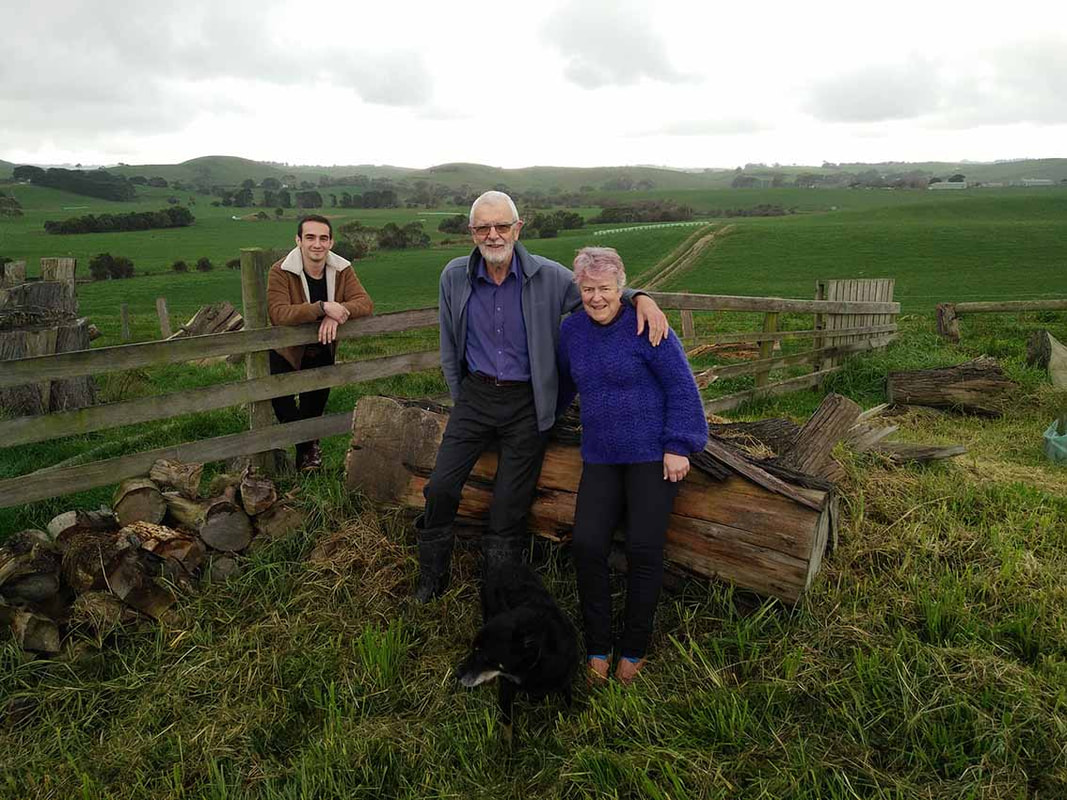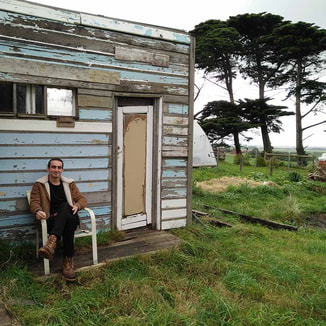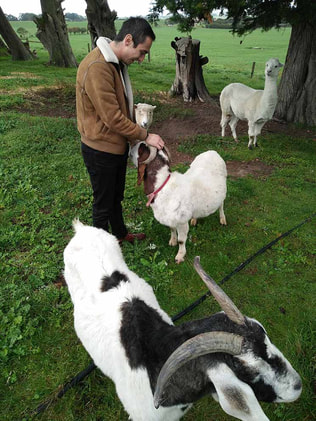 Jules Lebois-Fedeli, left, Harry Freeman and Maddy Harford at their West Creek farm
Jules Lebois-Fedeli, left, Harry Freeman and Maddy Harford at their West Creek farm By Catherine Watson
JULES Lebois-Fedeli spoke English proficiently but when he arrived in Melbourne, he kept hearing an expression he’d never heard before. From bar tenders to tram inspectors to shop assistants, everyone told the young Frenchman the same thing: “No worries”.
The expression came to sum up the easy-going attitude he’s found in Australians. “I love Australian people, actually. Compared to France, they’re more sympathetic, more friendly, sociable. If they have a problem with you they just tell you. But they don’t judge you. They are more open.
“It was quite easy to meet people when I arrived. You just walk into a bar and start talking. When people hear you’re from France, they ask you lots of questions.”
JULES Lebois-Fedeli spoke English proficiently but when he arrived in Melbourne, he kept hearing an expression he’d never heard before. From bar tenders to tram inspectors to shop assistants, everyone told the young Frenchman the same thing: “No worries”.
The expression came to sum up the easy-going attitude he’s found in Australians. “I love Australian people, actually. Compared to France, they’re more sympathetic, more friendly, sociable. If they have a problem with you they just tell you. But they don’t judge you. They are more open.
“It was quite easy to meet people when I arrived. You just walk into a bar and start talking. When people hear you’re from France, they ask you lots of questions.”
 Jules' favourite spot to watch the sun set
Jules' favourite spot to watch the sun set I’m asking Jules lots of questions when he tells me this. We’re not sitting in a bar but in the beautiful West Creek garden of Maddy Harford and Harry Freeman, who’ve been hosting Jules for the past two and a half months. He’s here as a WWOOFer (willing workers on organic farms), a scheme in which travellers got free board and lodging in exchange for a few hours work each day.
Working on a farm wasn’t on the timetable when Jules arrived from France in early January for the final year of a business studies degree at Australian Catholic University.
It was his mother who suggested he study in Australia. She’s always been a traveller, he says. He got thinking about it. It would look good on his resume. French people don’t travel so much. If an employer sees you’ve lived or studied overseas, they look on it favourably as a sign that you’re flexible and can think for yourself.
His course had barely started when the COVID-19 lockdown started. Suddenly classes were online and Melbourne was a ghost town.
It seemed a good chance to get away from the city and to see a bit of the country, while continuing his studies online. He arrived to stay with Maddy and Harry on their lifestyle block at West Creek, about 10 kms from Wonthaggi, in late March.
Working on a farm wasn’t on the timetable when Jules arrived from France in early January for the final year of a business studies degree at Australian Catholic University.
It was his mother who suggested he study in Australia. She’s always been a traveller, he says. He got thinking about it. It would look good on his resume. French people don’t travel so much. If an employer sees you’ve lived or studied overseas, they look on it favourably as a sign that you’re flexible and can think for yourself.
His course had barely started when the COVID-19 lockdown started. Suddenly classes were online and Melbourne was a ghost town.
It seemed a good chance to get away from the city and to see a bit of the country, while continuing his studies online. He arrived to stay with Maddy and Harry on their lifestyle block at West Creek, about 10 kms from Wonthaggi, in late March.
The green Gippsland countryside reminds him of Lorraine. He hails from Metz, an ancient cathedral city of about 200,000 people that’s been occupied or annexed by the Franks, the Romans, the French and the Germans (twice). Belgium, Luxembourg and Germany are all within an hour’s drive. Snow can lie deep on the ground for days in winter.
A few years ago his family moved to Reunion Island, a multi-racial, tropical French territory in the Indian Ocean, east of Madagascar. “My friends think I’m in my shorts on the beach,” he says as we contemplate the cold, grey day.
Jules marvels at the size of Australia, the fact that you can drive for half a day without seeing a town. Once his course finishes in November, he’s keen to hit the road and see a bit of it.
In the meantime, he savours the expansive views from West Creek. Each evening he rolls a smoke and sits in his favourite spot and watches the sun sinking through the cypress trees on the western boundary.
He met an Australian guy soon after he arrived in Melbourne and they became mates. His new mate is teaching him to speak Australian: ‘Fair dinkum … barbie … No worries. Oy mate.’ I love all these expressions.
But “Too easy” had him scratching his head. “I was getting a SIM card for my phone. I asked the guy and I was going to have to come back. He said ‘Too easy!’ I thought ‘No it’s not. It’s pretty inconvenient, actually.’ I was confused.”
A few years ago his family moved to Reunion Island, a multi-racial, tropical French territory in the Indian Ocean, east of Madagascar. “My friends think I’m in my shorts on the beach,” he says as we contemplate the cold, grey day.
Jules marvels at the size of Australia, the fact that you can drive for half a day without seeing a town. Once his course finishes in November, he’s keen to hit the road and see a bit of it.
In the meantime, he savours the expansive views from West Creek. Each evening he rolls a smoke and sits in his favourite spot and watches the sun sinking through the cypress trees on the western boundary.
He met an Australian guy soon after he arrived in Melbourne and they became mates. His new mate is teaching him to speak Australian: ‘Fair dinkum … barbie … No worries. Oy mate.’ I love all these expressions.
But “Too easy” had him scratching his head. “I was getting a SIM card for my phone. I asked the guy and I was going to have to come back. He said ‘Too easy!’ I thought ‘No it’s not. It’s pretty inconvenient, actually.’ I was confused.”

When it comes to comparing the cost of living in France and Australia, he takes a strictly student-centric view of life’s essentials: course fees, rent, alcohol and smokes. The cost of his course - $24,000 a year, about 16,000 euros, is double what he would pay at home. Rent in Melbourne is a bit more expensive. Liquor is about the same, as long as you go to the pub during “happy hour”. But the cost of tobacco – $40 plus for a very small packet – shocked him.
When he returns to France, he wants to do a masters degree and then perhaps to work in renewable energy. He’s been impressed by the local uptake of solar power, which is much higher than in France. There have been lots of discussions with Maddy and Harry about renewable energy and climate change.
He’s enjoyed the work – gardening, mowing, feeding the animals (two goats, a sheep and an alpaca). He’s helped build a pergola and a fernery and fixed up an old shed. “It doesn’t feel like work,” he says.
His final task before he returned to Melbourne last weekend was to help Harry and Maddy drench the animals, definitely a three-person job. No worries!
When he returns to France, he wants to do a masters degree and then perhaps to work in renewable energy. He’s been impressed by the local uptake of solar power, which is much higher than in France. There have been lots of discussions with Maddy and Harry about renewable energy and climate change.
He’s enjoyed the work – gardening, mowing, feeding the animals (two goats, a sheep and an alpaca). He’s helped build a pergola and a fernery and fixed up an old shed. “It doesn’t feel like work,” he says.
His final task before he returned to Melbourne last weekend was to help Harry and Maddy drench the animals, definitely a three-person job. No worries!